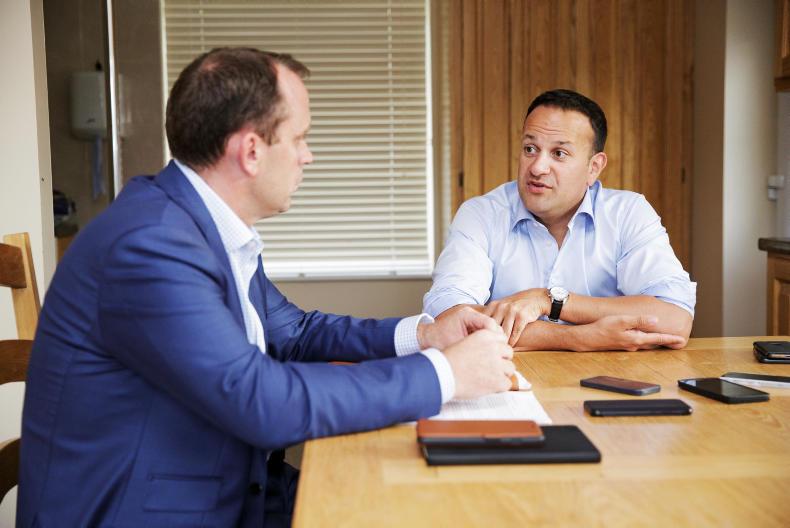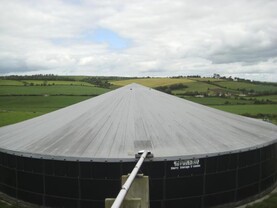Justin McCarthy: Given what’s at stake for farmers’ incomes, can you give farmers a guarantee or a level of comfort, that whatever the outcome on Brexit that there is going to be measures taken to protect their income?
Leo Varadkar: Obviously the result that we want out of the negotiations is that there wouldn’t need to be measures. What we want to achieve is what we’ve said from day one: protect the common travel area so people can travel freely between Britain and Ireland, make sure there’s no border between north and south and maintain trading arrangements for goods and services, particularly agricultural goods. If we can achieve that then Brexit shouldn’t result in any impact on farm incomes.
If we end up in a no-deal scenario or a hard Brexit scenario, and this is very much hypothetical, the impact on farming, on small exporting businesses and on agri food could be very severe. In that kind of scenario, we would need transition funds to help the agri food industry and farms to adapt to the new arrangements. We would need to apply for state-aid and that is understood across the European Union, but that’s not what we should be aiming for.
In any negotiations I’d be very careful about looking for state-aid packages, investment packages, too soon because that may be misinterpreted in some capitals as the Irish price for accepting a bad deal and I don’t intend to end up with that deal.
If we can keep the trading arrangements between Britain and Ireland very similar to what they are now then I think we dodge the bullet but we have to prepare for the possibility that things don’t work out.
JMC: In terms of what we’re hearing from Chequers, that the UK would stay in the single market for goods but not for services – would you support that?
LV: I know something like that won’t be acceptable across Europe because of the four freedoms. It’s not that such an arrangement mightn’t work for us, it’s that it wouldn’t be acceptable across the 27 member states and the reason why is that lots of other countries and Eurosceptic parties may want something similar – they may want one freedom or two. Then you’re talking about the entire European Union market breaking up – which is definitely not in our interest.
JMC: Are you less confident now or more confident now of reaching a solution that protects Irish interests?
LV: I’m still confident that we can achieve it. I can’t imagine that the UK will want to end up in a no-deal scenario, they are going to need a transition period. Increasingly we’ve seen them over the year or two moving closer to a more reasonable position. They’ve agreed to protect citizens rights, they’ve agreed to pay into the budget for the next two years if not longer, they’ve agreed they want a transition period and we’re starting to see evidence that they’re moving towards a request for a close relationship with the EU when it comes to customs and when it comes to goods.
What I should say is while single market access for all goods may not be possible, it may be possible for agricultural goods and they are treated differently.
JMC: Would you be concerned though at the same time of protecting the value in the UK market – we can have all the access we want but if we’re competing with south American product and what not, how would that work in that scenario?
LV: : Well that’s a real risk. If the UK were to pursue trade agreements with the US or South American countries, while we may still have access to the market, we may find out products displaced or devalued. That is why we have to not allow this ‘cake and eat it’ scenario to arise, where the UK would have both ways.
Listen to "Exclusive: An Taoiseach on CAP, Brexit and Mercosur" on Spreaker.
JMC: you have put on record as to your commitment to a fully-funded CAP budget or pushing for one, IFA have come out this week to have the budget index-linked because over the lifetime of the next reform farmers are being asked to do more for what is really less money. How far does your ambition go around the CAP budget do you think it’s real to get member states to increase the budget or is nearly holding the budget as good as we’re going to get?
LV: We have to be realistic, there are competing tensions there are a number of countries who have said that under no circumstances will they agree to an increase in contributions. We’ll be asking them to depart from that position. The vast majority of countries in the EU know that we have to find new money to do new things, whether it’s around security, migration, research and development.
Then there are countries like us and some others who are willing to pay more, but we want areas that are of particular importance to us to be protected, like CAP. The win-win scenario would be to pay no more and have an increase in CAP – that’s not going to happen. So I think a good outcome for us would be to have to pay a little bit more as a country but to have CAP protected and not to have reductions.
JMC: : One of the issues that’s coming to the fore in the next reform is the flexibilities at member state level and there’s been a lot of debate around capping of CAP payments. Do you see merit in the capping of payments and would you be concerned maybe the full-time farmer depending on the farm although he may have a bigger payment might be penalised, although a smaller farmer with off-farm income could actually be much more sustainable and economically secure than that larger scale farm that you may penalise in a capping system.
LV: Yeah talking to Minister Creed on this, the devil is going to be in the detail. We’re in favour of capping in principle, but it makes sense that we limit the amount of money that goes to the biggest farmers and the big commercial producers. We’re talking about a CAP of €60,000 with digressivity up to 100,000. We think that makes sense because you’re targeting supports to those who need it, but there could be anomalies.
JMC: On coupled payments for the low-income sectors, the tillage sector, the beef sector and sheep sector. There’s been calls for a suckler cow payment, the tillage sector is obviously under a lot of pressure … are you in favour of more targeted payments in the next CAP reform to those lower income sectors?
LV: We have a long way to go on the CAP reform yet. What I am particularly enthusiastic about is more payments that are related to environmental measures, increasingly becoming a common agricultural and environment policy and also around disadvantaged areas. The other area I would like to see us do more, if we can do it in the new CAP, is around farms being passed on. Given that the age profile of farmers, particularly outside of dairy, to encourage more people to pass on farms earlier. We’ve been sort of disinclined to support more coupled payments, largely because the concern there is that it will create problems for us in climate change, will create emissions and could even drive down prices. The focus should be on quality, productivity and efficiency.
JMC: Farmers are very much under the spotlight on climate change, do you think they are treated fairly and agriculture is given a fair deal when you look at how our production has increased since the 1990s and yet our emissions have more or less stagnated whereas transport and buildings has taken off. Is there too much attention paid to agriculture and being overly focused on compared to other sectors?
LV: My general sense, and I’m looking at this across the sectors whether it’s energy, transport … is that agriculture gets a bad press when it comes to climate change. That’s because maybe people don’t know all the facts. People who study this will know that we’ve had more production but not an increase in emissions. They’ll know that when it comes to dairy we’re the most carbon efficient, so if you displace that to another country you’re not helping the atmosphere you’re creating more problems. In beef we’re in the top five or six [when it comes to carbon efficiency].
I think we need to make that point more often in public, make sure that the public and the wider media, beyond the agricultural media, know that and that the NGOs that may know it actually accept it. But that doesn’t mean that agriculture gets a free pass when it comes to climate change. That isn’t possible.
LV: On Mercosur, president Junker made a presentation to us on the progress on the various trade deals, Japan is ready to sign, Mexico is almost done. Mercosur I think it’s increasingly unlikely that there will be a Mercosur agreement this year. The sense that I have is the South American countries haven’t really co-ordinated among themselves. The EU is very good at coming up with a common position, I get the sense that the South American countries don’t exactly have a common position and they are heading into an electoral cycle too, so I think it’s increasingly unlikely that we’ll have a deal in 2018, but we need to stay vigilant.
We have a very sensitive sector with beef.
JMC: You’re a medical doctor … in terms of trade deals and the need for food safety standards, obviously you're acutely aware of that. Do you feel that south American countries can meet the food safety standards that we produce food to here in Ireland and that there’s no health and safety risk to opening up our markets to imports from other countries where their standards have been shown not to be as good as ours?
LV: I think they can meet our standards, but we need to ensure that they do and that we have adequate inspection regimes in place to make sure that they meet any standards we have. We saw the difficulties in re-opening the Chinese market to Irish beef, similar issues in Japan. We see how those countries do inspections and really demand that we meet the standards that they set. We couldn’t have anything light touch in dealing with South American countries. I do think it’s possible for them to meet our standards, the technology exists. They can do it, maybe not on all their farms but certainly some of them.
JMC: But will they go to the cost?
LV: The threat for us is that they may be able to meet our standards at a lower cost but, we have to make sure that there isn’t a light-touch situation.
JMC: Finally Taoiseach, convince our readers that you get farmers and that you’re not a Dublin-centric Taoiseach?
LV: I am a Dublin TD, but I do have two uncles in farming, both in Waterford and a lot of people know that already and I’m in a party, Fine Gael, that is very well represented in Ireland and I know that in order for this Government to do well in the next election we’re going to need a strong turnout of our traditional farming support and if there’s anything politicians understand it’s electoral politics.






 This is a subscriber-only article
This is a subscriber-only article









SHARING OPTIONS: